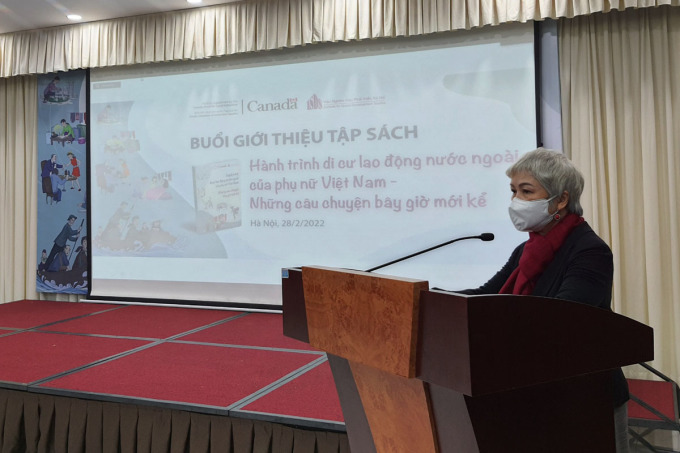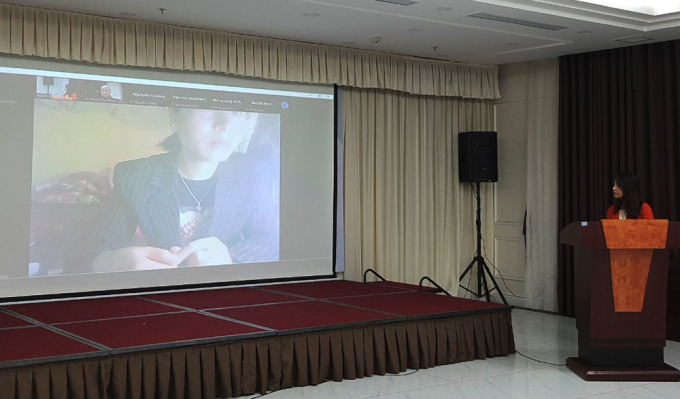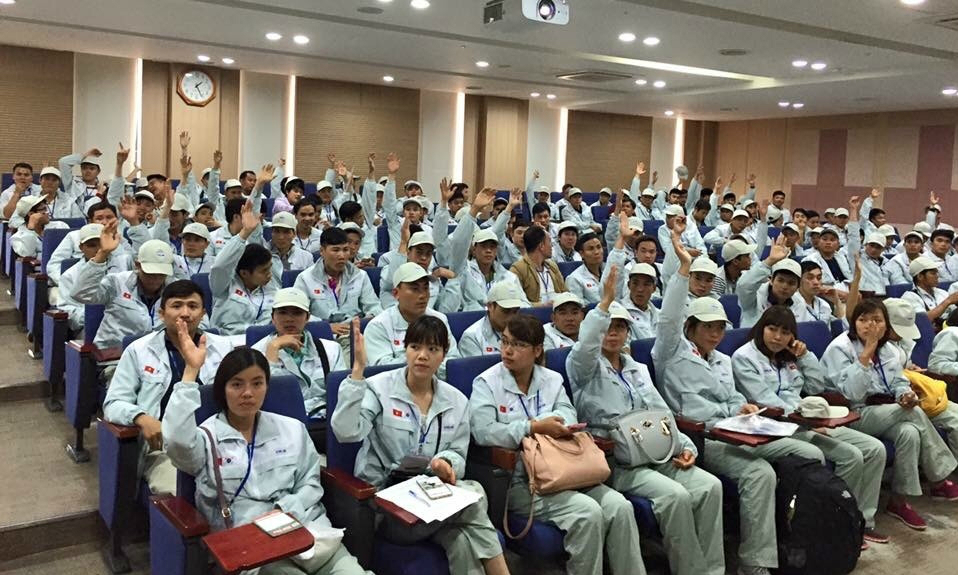Nguyen Thi Hoa, 37, ran away after having to work 20 hours a day for three months without getting paid and almost being abused by her employer in Thailand.
In 2006, her husband went abroad to work for a company in Malaysia, but faced problems and returned home empty-handed. He also racked up a debt of VND70 million ($3,000).
A year later Hoa had to borrow money and find a middleman to help find her a job overseas.
With just a tourist visa, she worked undocumented at a private garment factory for a salary of 4,000 baht ($122) a month.
Though she had to work from 6 a.m. to midnight, this was a dream salary for her because workers in Vietnam at that time were getting paid an average of VND600,000.
Hoa, a native of the central Ha Tinh Province, is one of many undocumented Vietnamese women who shared their experiences of working abroad undocumented at the launching of a book called ‘Hanh Trinh Di Cu Lao Dong Nuoc Ngoai Cua Phu Nu Viet Nam: Nhung Cau Chuyen Bay Gio Moi Ke’ (Vietnamese Women’s Labor Export Journey: The Untold Stories) on Feb. 28. The book was published by the Institute for Social Development Studies (ISDS).
 |
|
Khuat Thu Hong, director of the Institute for Social Development Studies, speaks at the launch of the book titled ‘Vietnamese Women’s Labor Export Journey: The Untold Stories’ on Feb. 28, 2022. Photo by VnExpress/Pham Nga |
Khuat Thu Hong, director of ISDS, said a large number of Vietnamese women seek undocumented work abroad, but there are no exact statistics.
In 2018, an estimated 540,000 Vietnamese worked abroad, more than 30 percent of them being women, according to statistics from the Ministry of Labor, War Invalids and Social Affairs.
A 2018 study by the ISDS in five provinces and cities found that 35 percent of women went abroad as guest workers because they had to pay off debts, 45 percent wanted to earn more money to improve their quality of life and 36 percent wanted to have money to build a house.
“Since most women don’t know the local language, many are exploited and face gender-based violence,” Hong said.
Hoa did not know the local language when she first went to Thailand, and so was happy to see that many of the workers at her factory were Vietnamese.
But her hopes were dashed right on the first day.
The boss told her to go down to the first floor and get a fan up to the third, but since she did not understand Thai, she went down and brought up a rice cooker instead.
The boss shook his head while the Vietnamese colleagues only looked at Hoa and laughed; no one told her what exactly she needed to get. She burst into tears after having to run up and down three times.
“Many times when the boss asked me to do something they deliberately mistranslated it for me,” she said.
She worked for three months without getting paid her salary and was only given enough money for basic needs. Furthermore, her boss molested her.
Knowing she had been deceived, she escaped leaving all her belongings behind. The only thing she took with her was her phone.
Fortunately, a friend let her stay at her home for one day. The next day Hoa called the middleman and asked him to get her a new job. He found her a job in a restaurant but asked her for half the first month’s salary as the fee.
Hoa’s is not a unique case. Many other Vietnamese women too have faced sexual harassment when working abroad.
Nguyen Thi Tinh, 38, went to Thailand with her husband to work but they lived in two different provinces. Tinh was lucky to find a good employer and was paid in time and in full.
Once she asked her owner to book a car for her to visit her husband, but the driver ended up trying to rape her.
She said: “He told me he wished he had a Vietnamese wife. I thought he only said that in jest and did not pay much attention to it. When he reached the fork in the road, he did not turn into the road leading to my husband’s place, and instead turned into the forest”.
She ordered the driver to turn around, but he locked the doors. She banged on the doors and tried to force them open to get out, but could not. She then picked up her phone and called her employer. When he called the driver, the man let her go and apologized for “taking a wrong turn”.
 |
|
Nguyen Thi Tinh speaks about her time in Thailand via Zoom during the book launch event on Feb. 28, 2022. Photo by VnExpress/Pham Nga |
But Tinh’s plight was nothing compared to what Nguyen Thi Minh and her husband had to go through. In 2010 the couple went to Thailand to work so that they could repay a debt.
Minh’s job was to plant flowers and take them to the market to sell for the owner. When he was away his boss molested his wife on two occasions but she did not have the courage to tell her husband.
The third time he returned from the market and caught his boss in the act. Though angry he let him go with a verbal warning since he needed the job.
But one day when she and her husband were working in the garden, officers came and arrested them and took them to the police station.
They were jailed for three months.
Later she learned that the owner had tipped off the police that the couple were undocumented workers.
The 2018 ISDS study found 18 percent of guest workers saying their biggest fear was getting arrested.
Prison is an indelible memory for Tran Thi Thu, who also went to Thailand to earn a living and was arrested because her passport expired.
In the jail a person who proclaimed herself to be the boss of the place searched her belongings, took away her phone and forced her to pay money.
Thu said she met many Vietnamese in prison, including a pregnant woman, and people from Laos, Cambodia, Indonesia, and Malaysia.
“People cried inconsolably at being arrested. Many were unable to sleep or eat. Every day in prison inmates would fight with one another”.
After a month in jail Vietnamese migrant workers could buy plane tickets to return home. But the pregnant woman could not leave because she was more than eight months pregnant, and was forced to deliver in prison.
Thu and another inmate volunteered to stay back and take care of her until she gave birth. When she delivered police officers pooled money to buy some items for the newborn.
“Watching the baby being born in prison made me feel heartbroken. Because of the family’s situation, the child had to suffer such a disadvantage”.
Despite the humiliation and hardship, Hoa and Tinh remained in Thailand for over seven years to earn a living.
Now they have returned home. Hoa runs a small business while Tinh, who is fluent in Thai, sells Thai products online to Japanese and Korean clients.
However, both their husbands still work abroad.
 |
|
Vietnamese workers attend a meeting of labor export. Photo courtesy of the Ministry of Labor, Invalids and Social Affairs |
Hong said her agency hopes stories like these help the community and policymakers better understand the difficulties, challenges and risks faced by women guest workers.
“We hope policymakers will make efforts to ensure women’s travel overseas to work becomes safer”.
Nguyen Song Bao Anh, her colleague at the ISDS, said to ensure their safety women who want to go abroad to work should connect with women guest workers’ networks to learn from their experience and know about safe, legal and appropriate foreign worker migration programs.
- Reduce Hair Loss with PURA D’OR Gold Label Shampoo
- Castor Oil Has Made a “Huge” Difference With Hair and Brow Growth
- Excessive hair loss in men: Signs of illness that cannot be subjective
- Dịch Vụ SEO Website ở Los Angeles, CA: đưa trang web doanh nghiệp bạn lên top Google
- Nails Salon Sierra Madre
 VnExpress News The News Gateway of Vietnam
VnExpress News The News Gateway of Vietnam





